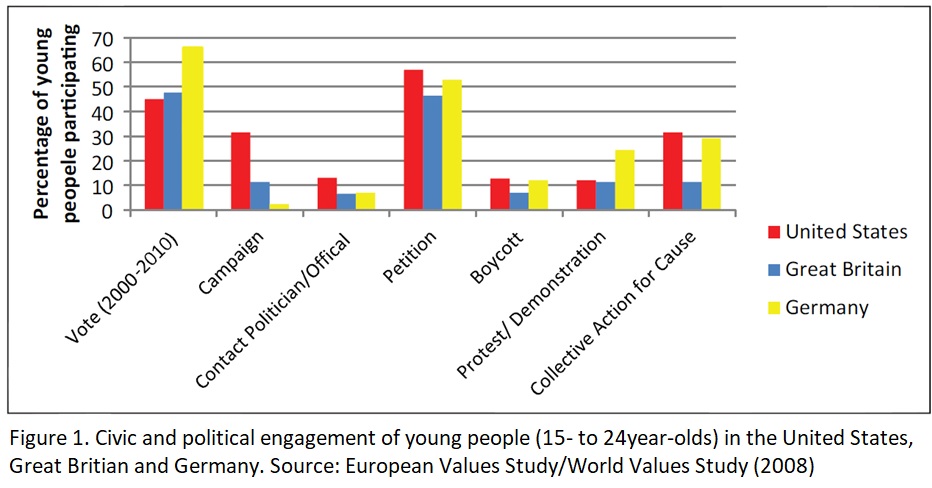The word ‘apathy’ is often used when discussing young people and politics, however studies have shown that it is not the lack of interest in politics that stops the youth from participating, as many young people show high interest in politics (Henn and Foard, 2014). It is rather the failure of connecting their own personal dissatisfactions with public issues that are widely discussed in media, as well as feeling politically alienated, that discourages the youth from political participation (Johnson and Marshall, 2004). So what are the reasons behind young people choosing to be active citizens or completely rejecting the idea of engaging politically?
Apathy? No. Lack of interest? No, again. Let’s try feeling politically alienated. Young people are criticised for not taking part in politics, but at the same time they are ridiculed by older generations and media when they choose to express their views and take action. It is a rare sight to see a politician attempt to actively engage with British youth. To discuss issues that are important to them, as well as their dissatisfactions with the current state of affairs. Perhaps the reason young people are so often ignored in the world of politics is because getting their vote is more difficult than of older generations who are more likely to vote in the elections, more likely to read the newspaper or follow the news on the T.V.. It has been shown that when an attempt is made to appeal to the youth, their voting impact can be felt. During the elections in 2010, Nick Clegg and the rest of Liberal Democrats called out to the youth, making promises regarding the tuition fees. Many young people have felt that there at last was a candidate, a party, which they could vote for, as they declared to protect the students’ interests. Well, we all know how that ended. Once elected, Liberal Democrats changed their manifesto and voted in favour of raising the fees. The levels of dissatisfaction were so high that students took it to the streets to protest; in London 30,000-50,000 people were involved in demonstrations that quickly turned violent. After that fiasco, how can young people not feel cynical about politicians promising to improve their lives? Earning their trust is not easy, but the recent Snap Election 2017 has shown that it can be done.
‘Youthquake’ has been widely discussed since the June 2017 elections. The concept is troublesome for the current establishment and perhaps the reason why many argue that youthquake is a ‘myth’, is because the idea of young people rejecting the current state of affairs and taking action is dangerous to politicians such as Theresa May and Jacob Rees-Mogg. Can politicians who want to privatise the NHS, are against women and LGBTQ’s rights and care only for the interests of the fellow rich businessmen and media moguls continue to represent the UK’s best interests? Regardless whether ‘youthquake’ is a myth or not, the youth’s interest in politics is on the rise and I believe that social media plays a major role in that. Jeremy Corbyn has appealed to the younger generation, as well as shared media content across social media platforms encouraging young people to register in time for the election and cast their vote. Not once has Theresa May stressed the importance of registration across any platform. Perhaps that was because she was aware that no young person could relate to her manifesto of the ‘Dementia Tax’, scrapping free lunches in schools or ridiculous attempts at appearing relatable that only proved how out of touch she is. I mean, running through the fields of wheat? Really?
If this country really wants to see more young people engaged in politics, an effort has to be made to make the politics not only more accessible. but also relevant. Some elements of UK politics are simply outdated. Watching old, male politicians heckling and, arguably, acting worse than spoiled children during important discussions in parliament such as regarding the state of the NHS, is incredibly discouraging and depressing. From my own experience, seeing that makes me feel hopeless about the future of UK politics, knowing that a change will not come easily. I am not alone, I am sure there are many young people out there that believe that their vote will not change the political landscape.
It has been shown that adding the subject of ‘citizenship’ as a compulsory element of curriculum in England in 2002 had little or no impact on voting behaviours, however civic education had positive impact on forms of political expression such as signing a petition (Manning and Edwards, 2014). Through the use of social media, young people can easily educate themselves about different issues, as well as sign and share petitions. There are alternative forms of engaging politically to voting and protests. It is relatively easier to sign a petition, or share an article, or a video on Facebook rather than organise a large-scale demonstration. Some may argue that this shows that young people are lazy with their engagement, but I believe that even the seemingly meaningless act of sharing a political ‘meme’ on the internet can have an impact, especially when done the right way.
European Values Study/World Values Study (2008), Comparative Study of Electoral Systems, national election studies.
Henn, M; Foard, N. (2014). Social differentiation in young people’s political participation: the impact of social and educational factors on youth political engagement in Britain. Journal of Youth Studies, 17 (3), 360-381.
Johnson C; Marshall B. (2004). Political engagement among young people: an update. Available: http://www.electoralcommission.org.uk/data/assets/electoral_commission_pdf_file/0016/16135/Politicalengagementamongyoungpeople_14096-10669__E__N__S__W.pdf.
Manning, N; Edwards, K. (2014). Does civic education for young people increase political participation? A systematic review. Educational Review. 66 (1), 22-46.
